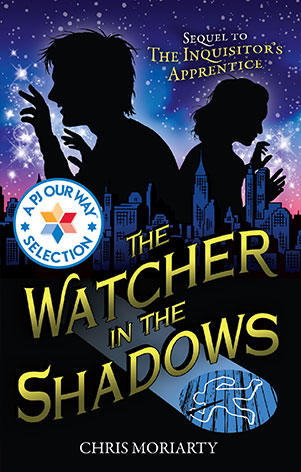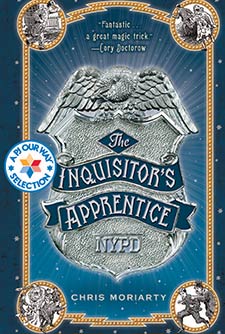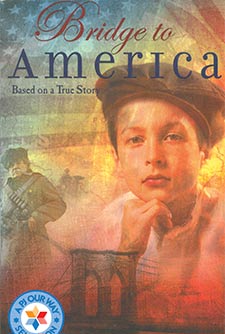The Watcher in the Shadows
Summoned by the evil J. P. Morgaunt, the Klezmer King’s killer is roaming the streets of a magical New York City. He can break in and out of the impenetrable Tombs; his voice sounds like the buzzing of a thousand flies; and he looks exactly like Sacha Kessler! Can Sacha stop the mysterious creature before someone else is attacked? Find out in this exciting sequel to The Inquisitor’s Apprentice!
Average Rating
( hint: Login to leave a review! )
42 Reviews
Leave Review
What the Book Is About
Jewish Content & Values
Positive Role Models
Content Advisory
Talk it Over!
More for You
What the Book Is About
This fun fantasy, rich in Jewish context, is a sequel to The Inquisitor's Apprentice. (Despite plenty of background information reiterated in this volume, to fully understand the story, kids might want to read the books in sequence.)
Thirteen-year-old Sacha Kessler’s special talent for seeing magic lands him an apprenticeship with the police department’s star inquisitors in a magical, turn-of-the-century New York City. In this fast-paced, exciting story, the Klezmer King has been murdered onstage during a performance, and Sacha is determined to find the killer before he strikes again. Sacha faces his doppelganger dybbuk once more, and the evil Morgaunt is still at large, attempting to control all the black magic in New York City. Full of period details about the Worker’s Rights Movement, neighborhood mafias, and the immigrant experience, The Watcher in the Shadows is fresh historical fiction with a magical twist.
Jewish Content & Values
- The Kessler family personifies the typical turn-of-the-century Eastern European Jewish immigrant experience of living in tenements, working in sweatshops, and celebrating traditional occasions like Shabbat and Passover.
- The story contains lots of Yiddish words and cultural references, including vaudeville and Klezmer.
- Sacha’s grandfather, an esteemed Kabbalist, shares with Sacha the teachings of Rabbi Isaac Luria (16th century Kabbalist), and he speaks about the mystical theories of tikkun olam (repairing the world,) ibur (friendly spirits), and gilgul neshamot (recycling of souls). Also, in an effort to protect Sacha, he encourages Sacha to inspire the dybbuk to do teshuva (repentance).
Positive Role Models
- Grandpa Kessler is a wise and loving grandfather. He finds ways to spend time with Sacha, offering Sacha multiple opportunities to ask for forgiveness for using his tefillin (a set of small black boxes containing scrolls of parchment inscribed with Torah verses, worn during weekday prayer) to summon the dybbuk in The Inquisitor’s Apprentice. He also refuses to use his substantial magical powers to fight – and potentially disturb – the order of the universe, preferring to use peaceful and loving methods to try and defeat the dybbuk instead. He consistently stands by his nonviolent principles even at the risk of his own life.
- Lily Astral is a steadfast and loyal friend. During the Pentacle factory strike, Sacha finds himself on the wrong side of the law while defending his sister from thugs brought in to break up the strike. When Sacha impulsively quits his job, it is Lily who encourages him to approach Maximillian Wolf and apologize.
Content Advisory
- There are several deaths in this action-packed mystery: the story begins with an investigation into the murder of the Klezmer King; a nameless teen is killed in an accident at a construction site; a minor character named Sam Schlosky dies while in jail; and Sacha’s grandfather sacrifices himself to the dybbuk to save Sacha’s life. None of the deaths are described in a graphic or gory way, but all add to the generally haunting mood of the book as Sacha and the Inquisitors search for a killer.
- There is some violence between the hired thugs and the strikers from the Pentacle factory.
- Some readers may be offended when Sacha breaks Shabbat by kindling a fire for Rivka Asher, the widow of the Klezmer King. Also, Grandpa Kessler, portrayed as an Orthodox Jew, requires his tefillin on Shabbat; (this is inaccurate as tefillin are never worn by Orthodox Jews on Shabbat).
- In an effort to contribute to the family’s dwindling finances, Uncle Mordechai decides to become a Lady’s Escort. In this bizarre moneymaking scheme, he is paid by wealthy parents to romance young ladies and break their hearts, thus disillusioning their beliefs in true love and encouraging them to marry the dull suitors their parents have chosen for them.
Talk it Over!
When he’s called upon to guard the factory workers’ strike, Sacha finds himself on the “wrong team.” He wants to do his job as an inquisitor, but he can’t stand by while his sister and her friends are bullied. Do you think Sacha did the right thing? Have you ever had a conflict of interest, and found yourself wanting to support the “wrong” team? What did you do?
More for You
Rabbi Isaac Luria (also known by his Hebrew acronym, the Arizal) lived in Safed in the sixteenth century. Although he only lived to the age of thirty-eight, he is considered one of the holiest leaders of the Jewish people and the greatest Kabbalist of his time. While he is famous for many teachings, he is best known for his conceptualization of “Tikkun Olam” (literally, repairing the world) as the Jewish responsibility to gather sparks of holiness in order to make the world a better place.
What the Book Is About
What the Book Is About
This fun fantasy, rich in Jewish context, is a sequel to The Inquisitor's Apprentice. (Despite plenty of background information reiterated in this volume, to fully understand the story, kids might want to read the books in sequence.)
Thirteen-year-old Sacha Kessler’s special talent for seeing magic lands him an apprenticeship with the police department’s star inquisitors in a magical, turn-of-the-century New York City. In this fast-paced, exciting story, the Klezmer King has been murdered onstage during a performance, and Sacha is determined to find the killer before he strikes again. Sacha faces his doppelganger dybbuk once more, and the evil Morgaunt is still at large, attempting to control all the black magic in New York City. Full of period details about the Worker’s Rights Movement, neighborhood mafias, and the immigrant experience, The Watcher in the Shadows is fresh historical fiction with a magical twist.
Jewish Content & Values
Jewish Content & Values
- The Kessler family personifies the typical turn-of-the-century Eastern European Jewish immigrant experience of living in tenements, working in sweatshops, and celebrating traditional occasions like Shabbat and Passover.
- The story contains lots of Yiddish words and cultural references, including vaudeville and Klezmer.
- Sacha’s grandfather, an esteemed Kabbalist, shares with Sacha the teachings of Rabbi Isaac Luria (16th century Kabbalist), and he speaks about the mystical theories of tikkun olam (repairing the world,) ibur (friendly spirits), and gilgul neshamot (recycling of souls). Also, in an effort to protect Sacha, he encourages Sacha to inspire the dybbuk to do teshuva (repentance).
Positive Role Models
Positive Role Models
- Grandpa Kessler is a wise and loving grandfather. He finds ways to spend time with Sacha, offering Sacha multiple opportunities to ask for forgiveness for using his tefillin (a set of small black boxes containing scrolls of parchment inscribed with Torah verses, worn during weekday prayer) to summon the dybbuk in The Inquisitor’s Apprentice. He also refuses to use his substantial magical powers to fight – and potentially disturb – the order of the universe, preferring to use peaceful and loving methods to try and defeat the dybbuk instead. He consistently stands by his nonviolent principles even at the risk of his own life.
- Lily Astral is a steadfast and loyal friend. During the Pentacle factory strike, Sacha finds himself on the wrong side of the law while defending his sister from thugs brought in to break up the strike. When Sacha impulsively quits his job, it is Lily who encourages him to approach Maximillian Wolf and apologize.
Content Advisory
Content Advisory
- There are several deaths in this action-packed mystery: the story begins with an investigation into the murder of the Klezmer King; a nameless teen is killed in an accident at a construction site; a minor character named Sam Schlosky dies while in jail; and Sacha’s grandfather sacrifices himself to the dybbuk to save Sacha’s life. None of the deaths are described in a graphic or gory way, but all add to the generally haunting mood of the book as Sacha and the Inquisitors search for a killer.
- There is some violence between the hired thugs and the strikers from the Pentacle factory.
- Some readers may be offended when Sacha breaks Shabbat by kindling a fire for Rivka Asher, the widow of the Klezmer King. Also, Grandpa Kessler, portrayed as an Orthodox Jew, requires his tefillin on Shabbat; (this is inaccurate as tefillin are never worn by Orthodox Jews on Shabbat).
- In an effort to contribute to the family’s dwindling finances, Uncle Mordechai decides to become a Lady’s Escort. In this bizarre moneymaking scheme, he is paid by wealthy parents to romance young ladies and break their hearts, thus disillusioning their beliefs in true love and encouraging them to marry the dull suitors their parents have chosen for them.
Talk it Over!
Talk it Over!
When he’s called upon to guard the factory workers’ strike, Sacha finds himself on the “wrong team.” He wants to do his job as an inquisitor, but he can’t stand by while his sister and her friends are bullied. Do you think Sacha did the right thing? Have you ever had a conflict of interest, and found yourself wanting to support the “wrong” team? What did you do?
More for You
More for You
Rabbi Isaac Luria (also known by his Hebrew acronym, the Arizal) lived in Safed in the sixteenth century. Although he only lived to the age of thirty-eight, he is considered one of the holiest leaders of the Jewish people and the greatest Kabbalist of his time. While he is famous for many teachings, he is best known for his conceptualization of “Tikkun Olam” (literally, repairing the world) as the Jewish responsibility to gather sparks of holiness in order to make the world a better place.



